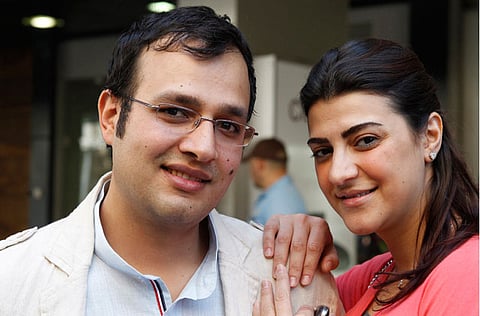Lebanon’s first civil marriage registered
President Sulaiman congratulates couple as overwhelming majority favours such unions

Beirut: Rejecting multi-pronged clerical objections, caretaker Minister of the Interior Marwan Sharbel took the unprecedented step of registering the civil marriage contract of Nidal Darwish and Kholoud Succariyeh, the first couple to celebrate a civil union in Lebanon.
President Michel Sulaiman congratulated the couple as the overwhelming majority of the public favoured such unions in the multi-confessional country.
Although Charbel acknowledged that the opportunity to legally challenge his decision with the Constitutional Court was a fact of life, his wish to modernise the system of laws inherited from the Ottoman Empire and the French Mandate, represented a major step forward.
To be sure, confessional laws discouraged civil marriages in Lebanon—and strongly disapproved of mixed Christian-Muslim weddings unless one of the two converted—even if this latest legally binding order may actually be the harbinger of a nascent civil state.
Whether by design or default, such a step encouraged citizens to think of their national rights and responsibilities, rather than pin all of their visions along sectarian lines. This too was unusual even if Charbel relied on the opinions of a group of legal experts that viewed existing regulations governing marriage, divorce and inheritance.
Succariyeh and Darwish, a mixed Shiite-Sunni couple, would now be able to legally create a family register (sijil nufus), rather than see their religious affiliations struck from their own records on account of their civil wedding.
To avoid such a dilemma, the couple could have easily flown to nearby Cyprus to marry, since Lebanese authorities recognized civil marriages registered abroad. Instead, they opted to challenge existing jurisprudence, and created an unprecedented legacy that granted them undeniable citizenship rights.
By defying present practices, they telegraphed officials that they would, henceforth stand before the state as citizens, not as members of a sect. As such, the courageous decision to dare the state paid off, further strengthening the country’s democratization process.


![Oman’s Maritime Security Centre confirmed four crew members injured. [Illustrative image. ]](http://media.assettype.com/gulfnews%2F2026-03-01%2Fv5np7wj5%2FOil-tanker.jpg?w=320&auto=format%2Ccompress&fit=max)
